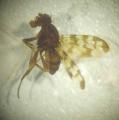Diptera.info :: Miscellaneous :: General queries
|
Smallest fly in the world?
|
|
| crex |
Posted on 20-09-2006 12:17
|
|
Member Location: Sweden Posts: 1996 Joined: 22.05.06 |
How small is the worlds tiniest diptera (in mm)? |
|
|
|
| Robert Nash |
Posted on 20-09-2006 15:33
|
|
Member Location: Ulster Museum, Belfast, Ireland Posts: 288 Joined: 11.11.05 |
Suggest Cecidomyiidae http://en.wikipedia.org/wiki/Cecidomyiidae many less than 1mm. long. World's smallest insects are in Hymenoptera See http://ufbir.ifas.ufl.edu/chap38.htm>Home page for other interesting insect records  Robert Robert |
| Paul Beuk |
Posted on 20-09-2006 16:13
|
|
Super Administrator Location: Netherlands Posts: 19403 Joined: 11.05.04 |
I am sure there are at least some Ceratopogonidae and Phoridae, too, that have similarly small species.
Paul - - - - Paul Beuk on https://diptera.info |
| Robert Nash |
Posted on 20-09-2006 17:13
|
|
Member Location: Ulster Museum, Belfast, Ireland Posts: 288 Joined: 11.11.05 |
So it seems Phoridae especially at (0.5mm) For a fascinating article on one effect of size on tiny insects read Life at Low Reynolds Number http://brodylab.eng.uci.edu/~jpbrody/reynolds/lowpurcell.html Robert |
| Paul Beuk |
Posted on 20-09-2006 17:48
|
|
Super Administrator Location: Netherlands Posts: 19403 Joined: 11.05.04 |
I forgot Psychodidae. And even Agromyzidae have very small species but probably not as small as the other families.
Paul - - - - Paul Beuk on https://diptera.info |
| crex |
Posted on 20-09-2006 21:21
|
|
Member Location: Sweden Posts: 1996 Joined: 22.05.06 |
Thanx for the link tips and suggestions. The people at Guinness World Records apparently has a bit of work left to do finding the tiniest fly  |
|
|
|
| Robert Nash |
Posted on 21-09-2006 08:53
|
|
Member Location: Ulster Museum, Belfast, Ireland Posts: 288 Joined: 11.11.05 |
And we both forgot Sphaeroceridae. Many species less than 1mm. and we must remember also poorly fed larvae become dwarf adults. Robert Edited by Robert Nash on 21-09-2006 08:54 |
| crex |
Posted on 01-01-2007 20:05
|
|
Member Location: Sweden Posts: 1996 Joined: 22.05.06 |
I read there are an american expedition going to Antarctica study the chironomid Belgica antarctica which they think are interesting because it can stand cold weather. Perhaps this is the most cold restistant diptera!? Which diptera can stand most heat then? I guess there can be some species where larva live in hot springs or something like that, otherwise I guess it's hard to tell which place is hotter than the other ... |
|
|
|
| rvanderweele |
Posted on 01-01-2007 22:26
|
|
Member Location: Leiden, the Netherlands Posts: 1988 Joined: 01.11.06 |
Rather cute: Empidideicus hungaricus Thalhammer, 1911. This is a 0.7-1 mm large or small Bombyliidae. Not the smallest, nevertheless...... ruud van der weele rvanderweele@gmail.com |
|
|
|
| bbrown |
Posted on 05-11-2011 22:28
|
|
Member Location: Los Angeles, California Posts: 103 Joined: 17.02.05 |
I wondered about this, too. I have a phorid of 0.4mm that I will describe as the world's smallest fly. Anyone disagree?
Brian Brown Entomology NH Museum of Los Angeles Co. |
| Nosferatumyia |
Posted on 05-11-2011 23:54
|
|
Member Location: Posts: 3553 Joined: 28.12.07 |
Ask Wayne Mathis and Chris Borkent. There are some really tiny ephydrids and gnats.
Val |
|
|
|
| bbrown |
Posted on 06-11-2011 00:17
|
|
Member Location: Los Angeles, California Posts: 103 Joined: 17.02.05 |
Wayne lists the smallest ephydrids and nannodastiids at 0.7 mm, almost twice the size of my fly. Nevertheless, I'll ask. Thanks for the advice, Val. Brian Brian Brown Entomology NH Museum of Los Angeles Co. |
| John Carr |
Posted on 12-11-2011 02:08
|
|
Super Administrator Location: Colorado, USA Posts: 10595 Joined: 22.10.10 |
According to the revision by Wirth and Grogan, the smallest Ceratopogonini have wing length 0.4 mm. http://books.goog...mp;lpg=PA1 |
| atylotus |
Posted on 03-01-2012 17:05
|
|
Member Location: Amsterdam, NL Posts: 1173 Joined: 29.05.09 |
To Crex: world famous I think is the chironomid Polypedilum vanderplanki whose larva is able to resist a temperature from -270 C to +102 C (although this will not occur anywhere in nature, I hope  see for instance: http://www.nature...336a0.html Edited by atylotus on 03-01-2012 17:06 |
|
|
|
| Jump to Forum: |













